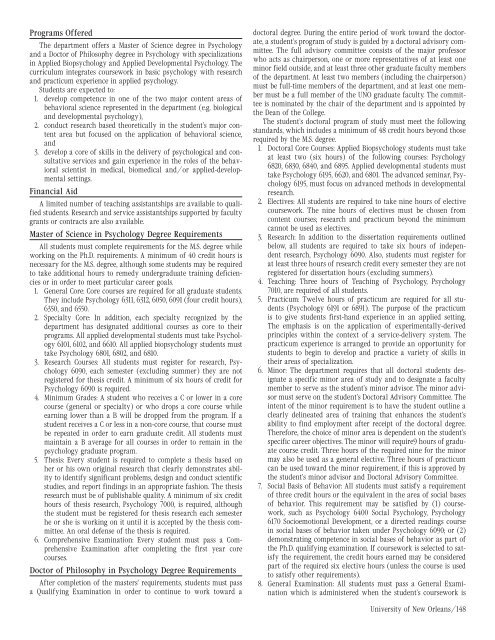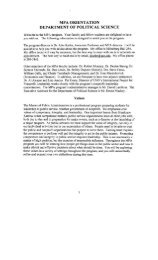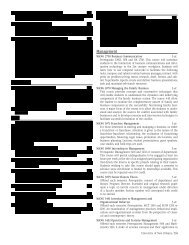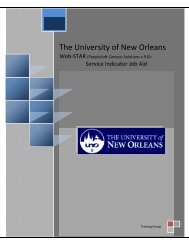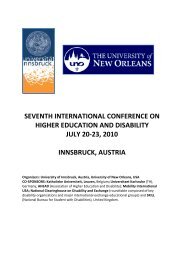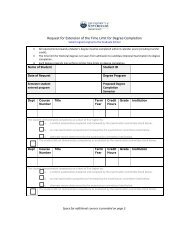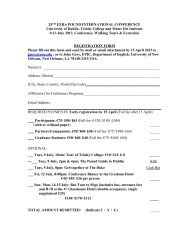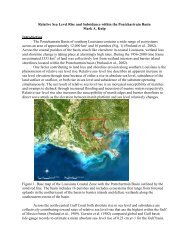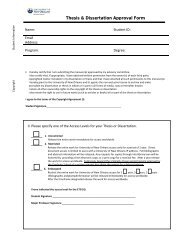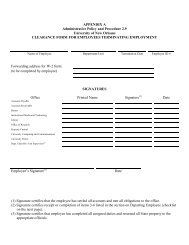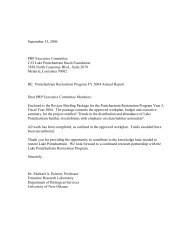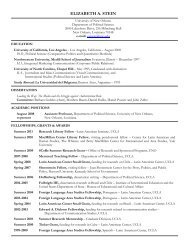Untitled - University of New Orleans
Untitled - University of New Orleans
Untitled - University of New Orleans
Create successful ePaper yourself
Turn your PDF publications into a flip-book with our unique Google optimized e-Paper software.
Programs Offered<br />
The department <strong>of</strong>fers a Master <strong>of</strong> Science degree in Psychology<br />
and a Doctor <strong>of</strong> Philosophy degree in Psychology with specializations<br />
in Applied Biopsychology and Applied Developmental Psychology. The<br />
curriculum integrates coursework in basic psychology with research<br />
and practicum experience in applied psychology.<br />
Students are expected to:<br />
1. develop competence in one <strong>of</strong> the two major content areas <strong>of</strong><br />
behavioral science represented in the department (e.g. biological<br />
and developmental psychology),<br />
2. conduct research based theoretically in the student’s major content<br />
area but focused on the application <strong>of</strong> behavioral science,<br />
and<br />
3. develop a core <strong>of</strong> skills in the delivery <strong>of</strong> psychological and consultative<br />
services and gain experience in the roles <strong>of</strong> the behavioral<br />
scientist in medical, biomedical and/or applied-developmental<br />
settings.<br />
Financial Aid<br />
A limited number <strong>of</strong> teaching assistantships are available to qualified<br />
students. Research and service assistantships supported by faculty<br />
grants or contracts are also available.<br />
Master <strong>of</strong> Science in Psychology Degree Requirements<br />
All students must complete requirements for the M.S. degree while<br />
working on the Ph.D. requirements. A minimum <strong>of</strong> 40 credit hours is<br />
necessary for the M.S. degree, although some students may be required<br />
to take additional hours to remedy undergraduate training deficiencies<br />
or in order to meet particular career goals.<br />
1. General Core: Core courses are required for all graduate students.<br />
They include Psychology 6311, 6312, 6050, 6091 (four credit hours),<br />
6350, and 6550.<br />
2. Specialty Core: In addition, each specialty recognized by the<br />
department has designated additional courses as core to their<br />
programs. All applied developmental students must take Psychology<br />
6101, 6102, and 6610. All applied biopsychology students must<br />
take Psychology 6801, 6802, and 6810.<br />
3. Research Courses: All students must register for research, Psychology<br />
6090, each semester (excluding summer) they are not<br />
registered for thesis credit. A minimum <strong>of</strong> six hours <strong>of</strong> credit for<br />
Psychology 6090 is required.<br />
4. Minimum Grades: A student who receives a C or lower in a core<br />
course (general or specialty) or who drops a core course while<br />
earning lower than a B will be dropped from the program. If a<br />
student receives a C or less in a non-core course, that course must<br />
be repeated in order to earn graduate credit. All students must<br />
maintain a B average for all courses in order to remain in the<br />
psychology graduate program.<br />
5. Thesis: Every student is required to complete a thesis based on<br />
her or his own original research that clearly demonstrates ability<br />
to identify significant problems, design and conduct scientific<br />
studies, and report findings in an appropriate fashion. The thesis<br />
research must be <strong>of</strong> publishable quality. A minimum <strong>of</strong> six credit<br />
hours <strong>of</strong> thesis research, Psychology 7000, is required, although<br />
the student must be registered for thesis research each semester<br />
he or she is working on it until it is accepted by the thesis committee.<br />
An oral defense <strong>of</strong> the thesis is required.<br />
6. Comprehensive Examination: Every student must pass a Comprehensive<br />
Examination after completing the first year core<br />
courses.<br />
Doctor <strong>of</strong> Philosophy in Psychology Degree Requirements<br />
After completion <strong>of</strong> the masters’ requirements, students must pass<br />
a Qualifying Examination in order to continue to work toward a<br />
doctoral degree. During the entire period <strong>of</strong> work toward the doctorate,<br />
a student’s program <strong>of</strong> study is guided by a doctoral advisory committee.<br />
The full advisory committee consists <strong>of</strong> the major pr<strong>of</strong>essor<br />
who acts as chairperson, one or more representatives <strong>of</strong> at least one<br />
minor field outside, and at least three other graduate faculty members<br />
<strong>of</strong> the department. At least two members (including the chairperson)<br />
must be full-time members <strong>of</strong> the department, and at least one member<br />
must be a full member <strong>of</strong> the UNO graduate faculty. The committee<br />
is nominated by the chair <strong>of</strong> the department and is appointed by<br />
the Dean <strong>of</strong> the College.<br />
The student’s doctoral program <strong>of</strong> study must meet the following<br />
standards, which includes a minimum <strong>of</strong> 48 credit hours beyond those<br />
required by the M.S. degree.<br />
1. Doctoral Core Courses: Applied Biopsychology students must take<br />
at least two (six hours) <strong>of</strong> the following courses: Psychology<br />
6820, 6830, 6840, and 6895. Applied developmental students must<br />
take Psychology 6195, 6620, and 6801. The advanced seminar, Psychology<br />
6195, must focus on advanced methods in developmental<br />
research.<br />
2. Electives: All students are required to take nine hours <strong>of</strong> elective<br />
coursework. The nine hours <strong>of</strong> electives must be chosen from<br />
content courses; research and practicum beyond the minimum<br />
cannot be used as electives.<br />
3. Research: In addition to the dissertation requirements outlined<br />
below, all students are required to take six hours <strong>of</strong> independent<br />
research, Psychology 6090. Also, students must register for<br />
at least three hours <strong>of</strong> research credit every semester they are not<br />
registered for dissertation hours (excluding summers).<br />
4. Teaching: Three hours <strong>of</strong> Teaching <strong>of</strong> Psychology, Psychology<br />
7010, are required <strong>of</strong> all students.<br />
5. Practicum: Twelve hours <strong>of</strong> practicum are required for all students<br />
(Psychology 6191 or 6891). The purpose <strong>of</strong> the practicum<br />
is to give students first-hand experience in an applied setting.<br />
The emphasis is on the application <strong>of</strong> experimentally-derived<br />
principles within the context <strong>of</strong> a service-delivery system. The<br />
practicum experience is arranged to provide an opportunity for<br />
students to begin to develop and practice a variety <strong>of</strong> skills in<br />
their areas <strong>of</strong> specialization.<br />
6. Minor: The department requires that all doctoral students designate<br />
a specific minor area <strong>of</strong> study and to designate a faculty<br />
member to serve as the student’s minor advisor. The minor advisor<br />
must serve on the student’s Doctoral Advisory Committee. The<br />
intent <strong>of</strong> the minor requirement is to have the student outline a<br />
clearly delineated area <strong>of</strong> training that enhances the student’s<br />
ability to find employment after receipt <strong>of</strong> the doctoral degree.<br />
Therefore, the choice <strong>of</strong> minor area is dependent on the student’s<br />
specific career objectives. The minor will require9 hours <strong>of</strong> graduate<br />
course credit. Three hours <strong>of</strong> the required nine for the minor<br />
may also be used as a general elective. Three hours <strong>of</strong> practicum<br />
can be used toward the minor requirement, if this is approved by<br />
the student’s minor advisor and Doctoral Advisory Committee.<br />
7. Social Basis <strong>of</strong> Behavior: All students must satisfy a requirement<br />
<strong>of</strong> three credit hours or the equivalent in the area <strong>of</strong> social bases<br />
<strong>of</strong> behavior. This requirement may be satisfied by (1) coursework,<br />
such as Psychology 6400 Social Psychology, Psychology<br />
6170 Socioemotional Development, or a directed readings course<br />
in social bases <strong>of</strong> behavior taken under Psychology 6090; or (2)<br />
demonstrating competence in social bases <strong>of</strong> behavior as part <strong>of</strong><br />
the Ph.D. qualifying examination. If coursework is selected to satisfy<br />
the requirement, the credit hours earned may be considered<br />
part <strong>of</strong> the required six elective hours (unless the course is used<br />
to satisfy other requirements).<br />
8. General Examination: All students must pass a General Examination<br />
which is administered when the student’s coursework is<br />
<strong>University</strong> <strong>of</strong> <strong>New</strong> <strong>Orleans</strong>/148


